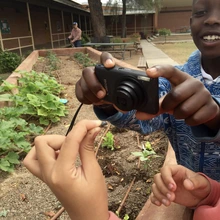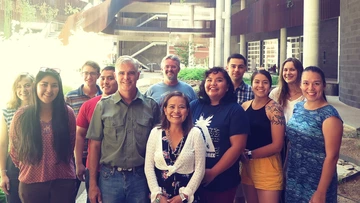The University of Arizona connects with the community through outreach and partnerships that educate community members about and promote sustainable agriculture and gardening, water and watershed conservation and restoration, and more.
University of Arizona Community and School Garden Program

The University of Arizona’s Community and School Garden Program (CSGP) connects Tucson educators and community organizations with university students eager to participate in the school garden movement occurring throughout the country. University student interns are matched with low-income school and community placement sites where they support the installation, development and maintenance of a garden program.
The program includes a Green Academy for Garden-Based Curriculum Integration, which provides teachers and UArizona interns with grade-appropriate, subject-specific, garden-based lesson plans. These lessons are developed according to Common Core standards and adhere to the principles of placed-based education. The Green Academy is also based on professional development workshops offered biannually that demonstrate the basics of gardening, such as soil science, composting and aquaponics.
Project WET (APW)
Arizona Project WET is a UArizona professional-development program for teachers, helping develop their instructional practices and content knowledge. The program also provides opportunities for direct student outreach and educational experiences inside and outside the classroom.
Programs offered include:
- School Water Audit Program, which incentivizes school and community water conservation through student-driven inquiry and installation of water-conserving technology
- Arizona Water Festival Events
- Teacher Academies
- Water Scene Investigations, involving installation of water efficient technology and the comparison of water savings with other water users.
- The Aqua STEM Program, which aids teachers in implementing STEM units, and provides coaching and in-classroom presentations.
WRRC Brown Bag Seminars and Webinars
Each year the Water Resources Research Center brings a diverse slate of speakers to the University of Arizona through its publicly accessible Brown Bag seminar series. UArizona and community residents are invited to attend the series of talks by experts on water-related topics of interest in person or via online webinar. The lectures take place approximately biweekly at noon during the academic year. Slide presentations of most past brown-bag seminars are also available on the WRRC website.
Citizen Water Academy
With partners Tucson Water and the Pima County Regional Wastewater Reclamation Department, the Univeristy of Arizona Water & Energy Sustainable Technology (WEST) Center offers a Citizen Water Academy for the community that includes lectures, tours, and activities focused on local water supplies, the wastewater reclamation process, and water research and innovation. The class is conducted weekly for four or five weeks in the early evening and is offered in the spring and fall. Tours include the Advanced Oxidation Process Water Treatment Facility, Sweetwater Wetlands, the Tres Rios Water Reclamation Facility, and the WEST Center.
Energy Talks
The University of Arizona’s Institute for Energy Solutions sponsors a series of evening community lectures on cutting-edge topics in energy that are given by distinguished faculty and advanced graduate students at off-campus venues. Past topics have included using renewable energy for greener food production, climate positive buildings, the next wave of solar cells, controlled environment agriculture, and low-energy water purification. Energy Talks for Spring 2021 are currently on hold due to COVID-19 restrictions.
Indigenous Food, Energy, and Water Security and Sovereignty (Indige-FEWSS)

The NSF-sponsored Indigenous Food, Energy, and Water Security and Sovereignty (Indige-FEWSS) project is based at the University of Arizona and partners with Diné College and other community groups on the Navajo Nation, where approximately 35 percent of dwellings are not connected to central power or potable water. The goal is to develop a diverse workforce with intercultural awareness and food-energy-water security (FEWS) expertise to address food, water and energy challenges in indigenous communities. The project incorporates local/indigenous knowledge with science and engineering knowledge in the development of technical solutions. It includes a fellows program and provides hand-on educational experiences for students in indigenous communities.
The Sustainable Bioeconomy for Arid Regions (SBAR) Center of Excellence
Led by the University of Arizona, SBAR includes seven partner institutions, and provides stakeholders interested in expanding crop options that support the rubber and biofuel industries with regional solutions that are economically viable, socially acceptable, and meet the water conservation needs of the arid Southwest.
The Center’s Education Team aims to engage citizens, meet future workforce needs, and enhance science literacy in agriculture and biofuels through its K-12 biofuel curriculum. Program implementation includes mentoring graduate student fellows and teachers in Arizona and New Mexico. Summer and school-year internships are provided to high school students and undergraduate students on a variety of agriculture and biofuel topics.
Arizona Envirothon Symposium
Each year the UArizona Department of Environmental Science and Cooperative Extension welcome over 60 Arizona high school students to the University of Arizona to practice for Envirothon, a team competition for high school students in the United States, Canada and China that utilizes in-class curriculum and hands-on outdoor field experiences to develop the principles and practices of natural resource management ecology in young people. Attendees demonstrate their knowledge and aptitude of environmental science and natural resources on multiple topics. UArizona experts on diverse topics – such as aquatic ecology, wildlife, soils and forestry – help them better prepare for the competition.
Santa Cruz River Heritage Project
UArizona Assistant Professor Michael Bogan is working with Pima County Wastewater on a project to bring treated wastewater to the Santa Cruz river south of downtown Tucson and to create perennial flow within the river channel. The purified reclaimed water reenters the water system as groundwater recharge and percolates through the ground to be stored in the aquifer. The replenishment also earns Tucson Water a recharge credit from Arizona’s recently passed Drought Contingency Plan for the Colorado River.
Bogan is studying the effect of the replenished flow on the rapid transformation and expansion of habitat, which is drawing high numbers of dragonfly and damselfly species as well as amphibians, birds, reptiles, and mammals to the waterway.
